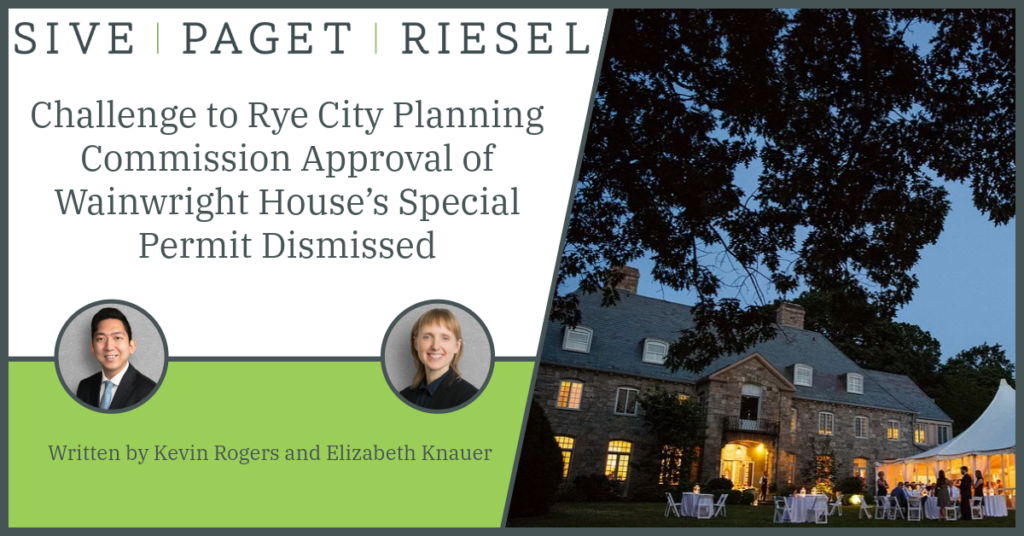Blog

Challenge to Rye City Planning Commission Approval of Wainwright House’s Special Permit Dismissed
On November 9, 2023, Acting Justice Robert J. Prisco of the New York State Supreme Court, Westchester County, dismissed an Article 78 petition brought by neighbors of the Wainwright House in Rye, New York. The petitioners had sought to annul the special permit renewal issued by the City of Rye Planning Commission (CPC) in 2021, which allowed Wainwright House to continue to host weddings and other seasonal outdoor events in a tent on its property, as it has done for many years. Justice Prisco’s decision in Robert L. Alexander & Elizabeth C. Alexander, Trustees, as Trustees of the Robert L. Alexander Revocable Trust and Elizabeth C. Alexander Revocable Trusts, et al. v. City of Rye Planning Commission, et al. (Westchester County Index No. 67725/2021) upheld the CPC’s approvals based on bedrock principals of administrative law.
Established in 1951, Wainwright House is the oldest not-for-profit, non-sectarian holistic learning center in the nation and is located in a waterfront residential zoning district in Rye’s historic Milton Point neighborhood. In addition to Wainwright House, the Milton Point neighborhood also contains several private social clubs. The residential zoning district in which Wainwright House lies permits religious uses by special permit.
The CPC had previously issued special permits in 2011 and 2015 to authorize Wainwright House’s seasonal tent use (subject to certain operational constraints) and recognized Wainwright House’s long-standing designation as a religious use. In conjunction with the special permits, the CPC adopted SEQRA negative declarations finding that there would be no significant environmental impacts from the seasonal tent use.
In early 2021, Wainwright House applied to renew its special permit for an additional three-year term. After public review and comment (including revisions to the special permit requested by the neighbors), the CPC ultimately passed two resolutions in September 2021 granting Wainwright House’s special permit renewal and reaffirming the conclusions of the CPC’s environmental review under SEQRA of the previous permits.
In December 2021, a group of neighbors commenced an Article 78 proceeding to challenge the 2021 CPC resolutions. The petitioners principally alleged that: (i) the CPC failed to strictly comply with SEQRA procedures; (ii) the CPC should have reviewed the 2021 permit renewal application de novo instead of relying on its prior findings; (iii) the 2021 resolutions lacked “substantial evidence” in the record; (iv) the 2021 resolutions failed to discuss the additional zoning standards and requirements applicable to Wainwright House’s special permit; (v) the proposed tent use did not meet those zoning standards and requirements; and (vi) the CPC acted ultra vires by approving the 2021 special permit renewal without requiring Wainwright House to demonstrate its religious use.
The Court’s November 2023 decision dismissed all of petitioners’ claims.
In response to petitioners’ allegation (i) that the CPC failed to adhere to SEQRA procedures, the Court found that, although the minutes of the meeting indicated that the CPC formally adopted the SEQRA negative declaration a few minutes after its separate resolution granting the special permit, the CPC’s voting order on the resolutions represented nothing more than “a harmless, nonprejudicial misstep.”
The Court found petitioners’ claim that (ii) the CPC should have reviewed Wainwright House’s 2021 special permit application de novo was based on an incorrect interpretation of the CPC’s 2015 resolution. The decision hinged on the distinction between “should” and “shall” in the CPC’s prior resolution; the 2015 resolution stated that Wainwright House “should” apply for a permit renewal at least one year ahead of the 2015 permit’s expiration in October 2021. While petitioners argued that this provision set a deadline for Wainwright House’s permit renewal application, after which the application would be considered a new permit, the Court disagreed and found that such permissive language did not establish any fixed deadline. Accordingly, the CPC was entitled to rely on its prior 2015 findings.
The Court also determined that petitioners had incorrectly argued that (iii) “substantial evidence” was required to support the CPC’s decision. Because the CPC’s permit process was not a quasi-judicial proceeding, “substantial evidence” was not the correct standard for judicial review, and the Court clarified that the more deferential “arbitrary and capricious” standard which applied instead was satisfied.
Petitioners’ claims that (iv) the CPC’s 2021 resolutions failed to discuss the additional zoning standards and requirements applicable to Wainwright House’s special permit and (v) that Wainwright House’s proposed tent use did not meet such standards and requirements were also rejected. The CPC’s 2011 resolution granting Wainwright House’s initial special use permit had appropriately reviewed and discussed all applicable zoning criteria. Subsequently, the CPC incorporated its 2011 findings into both the 2015 and 2021 resolutions, concluding that Wainwright House’s permit renewals remained consistent with those zoning criteria. As the Court held that the CPC was entitled to rely on its prior findings, it found petitioners’ claims that Wainwright House application did not meet the zoning standards and requirements lacked merit.
Last, the Court held that (vi) petitioners’ challenge to Wainwright House’s designation as a religious use and the CPC’s acceptance thereof was barred by the statute of limitations and that petitioners had failed to exhaust their administrative remedies. The administrative record demonstrated that the CPC had recognized Wainwright House’s designation as a religious use since its incorporation in 1951. In addition, the CPC had expressly recognized that Wainwright House is a “religious and spiritual institution” in the 2011 resolution, which it incorporated and re-affirmed in both of its 2015 and 2021 resolutions. As petitioners had failed to administratively appeal the 2011 and 2015 resolutions within 60 days as required by the General City Law, and the CPC’s prior findings that Wainwright House constitutes a religious use were incorporated into the 2021 resolutions, the Court held that petitioners’ challenge to the religious use designation was precluded.
SPR is proud to have represented Wainwright House pro bono in this Article 78 special proceeding. For more information about this case or SPR’s other pro bono work, please contact Elizabeth Knauer and/or Kevin Rogers.